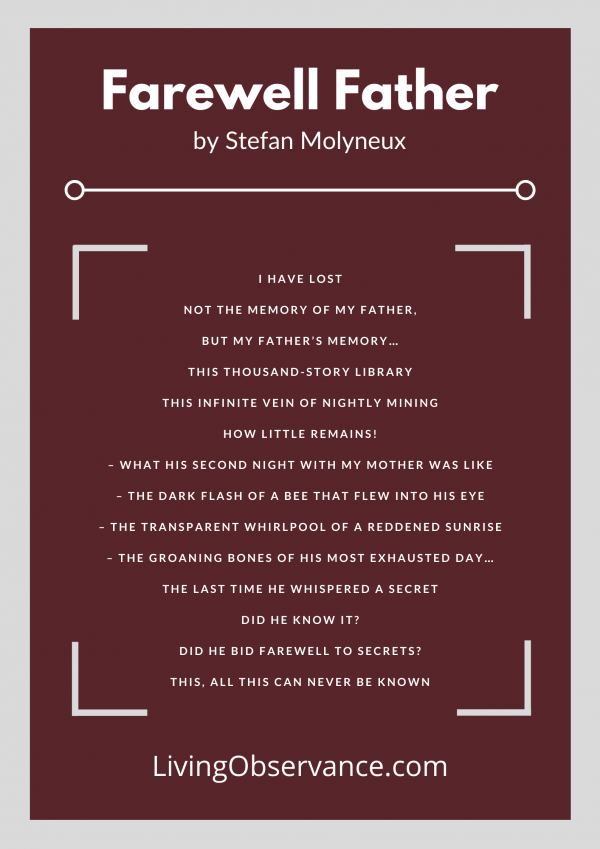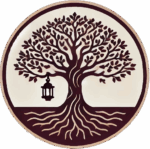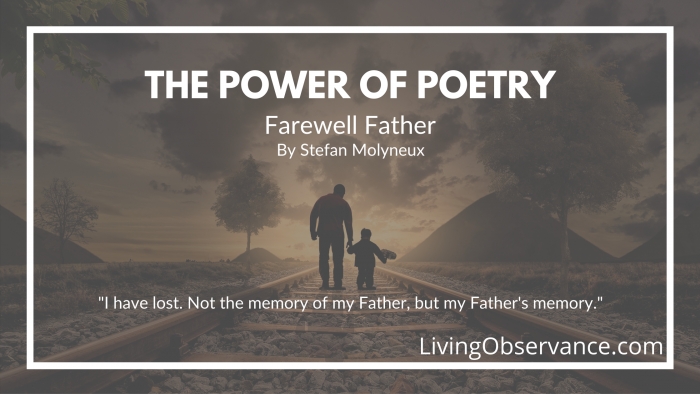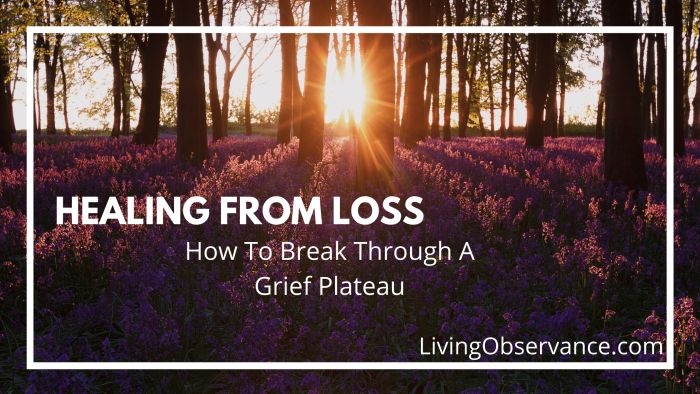Art has an undeniable ability to touch parts of our hearts that are often locked away and only accessible through our subconscious. Not every piece of art has the keys to unlock the guarded door, and we can’t predict if a sculpture, painting, or song will be the arrow that pierces our soul. Even if you aren’t typically able to understand art, like me, we can still appreciate great art when we see it. During my darkest hour of grieving, after we had lost 5 of our relatives and then had to put our cat of 17 years to sleep, I came across a poem that struck at my core. It simultaneously hurt to read the truth it carried and healed much of the pain I had been enduring up to this point.
At a Glance
- Personal Story: Hidden Source of Pain
- Excerpt of Poem About Father That Died
- The Effect of Farewell Father on My Life
- The Importance of Preserving Memories of Loved Ones
- Conclusion
A Story From My Grief Journey – Hidden Source of Pain
After experiencing so much loss in a short period of time, the pain of losing a loved one had become commonplace. Through all of the hurt, I constantly asked myself why? Why do I feel so much pain? Why is it that I still have so much pain surrounding my Mother’s death when it was over 3 years ago? Why can’t I seem to find any kind of closure? Why can’t I just move on!
That question of “why” plagued me for years. Rationally I know that everyone will die. Logically the people that we are closest to will hurt the most to lose. The question of “why can’t I just move on?” was answered when I learned about Dr. Tony Walter’s New Model of Grief. After months of reading, I still couldn’t answer what caused the intensity of my pain.
It wasn’t until I stumbled upon the most powerful poem I encountered during my grief journey that I finally understood. Three lines and only 13 words. Those 13 words provided me with clarity of not only my own grief but exactly what I had seen in others. Those insightful 13 words are:
“I have lost. Not the memory of my father, but my father’s memory.”
An Excerpt of Farewell Father, by Stefan Molyneux

(You can view the entire poem by clicking here)
The Effect on My Life
After hearing those 13 words from the poem, I understood that my pain was coming from the idea that I might lose my Mother’s memory. As I mentioned in my post about The Top 5 Things I Wish I Knew Before Losing A Loved One, I talked to my Mom daily. Even though I talked to her daily, there is still so much that I don’t know about her. Ultimately I was afraid of losing the things that I did know about her; the nuances of her personality, the quirkiness of her sense of humor, and the tenderness of her heart.
After her second stroke, our roles reversed, and I was more of a caregiver than a son. Our conversations turned from her history and experiences to ensuring she took her medication and ate that day. Then, all of a sudden, without my input, I could never ask her another question. The great privilege of learning about her was no longer available to me because of the third stroke, which ultimately claimed her life. There were many serious (or maybe “important” is the right word) topics that I wanted to talk about, but I wanted to wait for the appropriate time. Now there was no time, no conversations, and no answers.
Nearly 3 years after my mom passed away, I lost my Grandpa to brain cancer. We had over a year together from his diagnosis to his passing. Throughout his declining health, I began helping with some chores, hydration therapy, picking him up if he fell, and staying by his side when he was in the hospital. While the hospital visits were not the best reason to be together, they were a huge gift to me, and I like to think that he also enjoyed our time together. We talked about my Mom (his daughter), shared tears about our loss, and we talked about his experiences through life.
I always knew my Grandpa, but I only knew him as my Grandpa. Through those conversations, I was able to see a sliver of him as a soldier, a friend, a community member, a father, and a husband. His lessons about the importance of dedication to wife and kids became the foundation of what I am striving for in my own family. I had time to ask questions and learn from my Grandpa before I lost him.
The biggest difference between losing my Mom and losing my Grandpa is the number of intentional conversations we had. With my Mom, I didn’t recognize that there was a time limit on our time together, and I put off those intentional conversations. With my Grandpa, it was a race to collect, just like the poem referenced, as many stories from his exclusive library as possible.
Recreating The Library
After someone is buried, it is common for the people in attendance to share their fondest memories with the surviving family. I realized that those conversations are actually like the process of returning a book to the library. The stories comfort the family because the family reclaims a part of the person that they have lost. While it is impossible to rebuild the entire library, we can preserve enough to have a very good representation of the person we lost.
I found the process of collecting as many of these memories as possible to be the best medicine for the pain immediately following my losses. On the long road of healing after my losses, I occasionally fall into low spots. By returning to the library of memories I collected and focussing on the incredible life of the person I lost and their impacts on the people in their lives, I quickly put myself in a much better mood.
This idea is what inspired me to begin developing a website that will allow me to easily collect stories and memories, store them in a safe place, and return to them any time I wanted. I noticed that as people shared stories with me about someone I lost, I would often be reminded of another story. When I would share the story I was reminded of, it would inspire the listener to share a different story. The more people that participated, the more stories I could collect. The more stories I could collect, the less my grieving journey hurt.
Conclusion:
You never know what will inspire you. You don’t know when it will happen. You don’t know the magnitude of change that will come. For me, thirteen words from a poem inspired me to embark on a quest to ease the pain of losing loved ones for as many people as possible. The biggest piece of advice I can give you is to start collecting books for your library!
What do you think of this poem? Are there any pieces of art that have helped you on your grieving journey? Is there a piece that you want me to cover? If you are curious about the website I used to collect and store memories, join our mailing list to receive exclusive updates!



